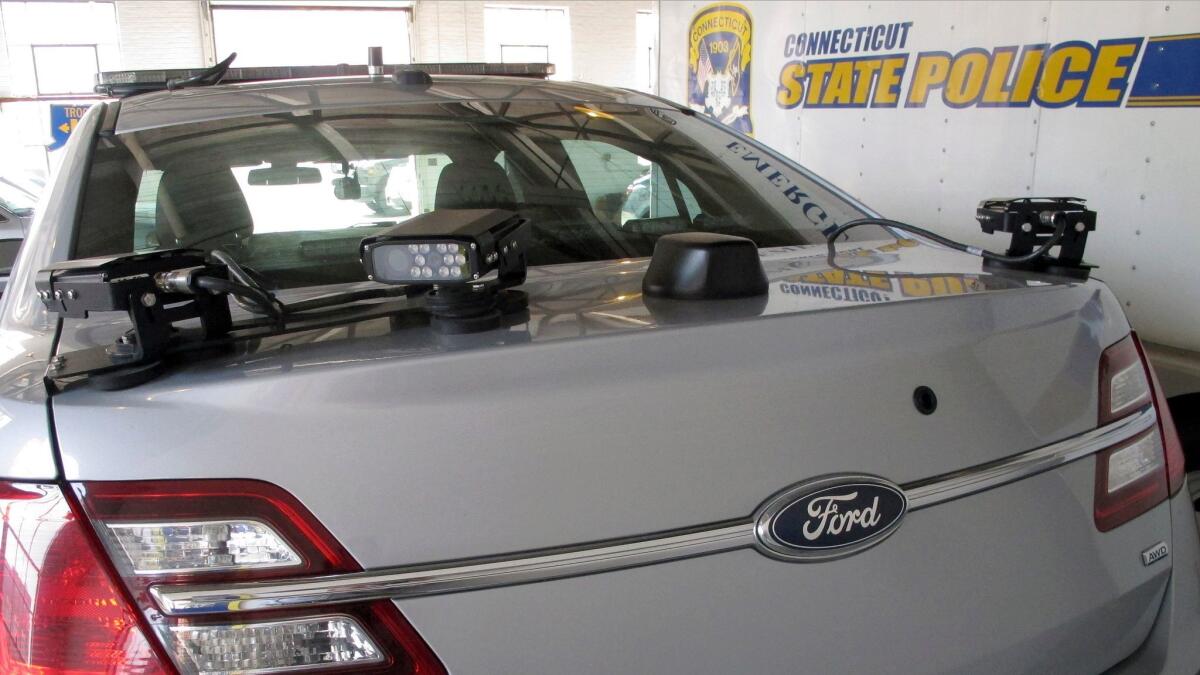Editorial: Private surveillance databases are just as intrusive as government ones

- Share via
When someone drives down a street or parks a car at a curb, there is no expectation of privacy — the driver, the car and the license plate are in public view. Yet most people would recoil if the government announced a program to scan those license plate numbers into a database it could use to determine whose car was parked where and when. It’s an obnoxiously intrusive idea that sneaks over the line between a free society and Big Brother dystopia. The notion that the government could trace people’s travels whenever it wishes undercuts our fundamental belief that, barring probable cause to suspect involvement in a crime, we should be able to move about freely without being tracked.
But government agencies, from local police departments to Immigration and Customs Enforcement, are able to do just that. Some police agencies — including the Los Angeles Police Department and the Los Angeles County Sheriff’s Department — maintain their own databases of scanned plates, which is problematic enough without proper policies and controls in place. Many share with other agencies in broad networks. Some agencies contract with private vendors that build massive databases by merging feeds from automatic license plate readers. So while police must obtain a warrant before placing a tracking device on someone’s car, they do not need a judge’s permission to contract with a database — or build their own — and, theoretically, track a person’s movements over time by consulting records of where his or her car has been spotted.
There are legal gaps that jeopardize our fundamental right to be left alone to conduct our daily business.
At least, that’s the way the law stands today. The 4th Amendment’s protection against unreasonable searches and seizures requires the government to obtain a warrant based on probable cause before collecting certain types of personal information. But the Supreme Court has held that this requirement only applies when the public has a reasonable expectation that the information will remain private.
We have been concerned about the broad spread of license-plate scanners in recent years primarily because of the potential for ubiquitous monitoring. Clearly, a database that allows police to, in essence, go back in time and see what cars might have been parked outside a store as it was being robbed could be a useful investigative tool. But at what cost?
Under this privatized system, government officials can enter a license plate and receive an alert as soon as it turns up on any of the nationwide army of scanners — in police cars, on utility poles, in cars driven by private citizens working with the vendors — that feed these databases. Because the data is not purged after a short amount of time, it also means police can plug in a license plate and find out where a car had traveled on any specific day going back years. Such an arrangement might pass constitutional muster, but it certainly violates our right and expectation to not have our daily activities collected and saved for retrieval by government agents.
The top company selling such data, Vigilant Solutions — which claims more than 5 billion archived detections and another 150 million added monthly — is under no obligation to purge license-plate captures after a reasonable period of time. And there are no legal restrictions on to whom it may sell access. Such companies tend to cater to government agencies, insurance companies, collections agencies and other businesses with an interest in figuring out where a specific car has been. But they could easily decide to fully democratize access by selling the service to individuals. Imagine the repercussions if someone could create an account, pay a fee, enter a license plate number and establish an alert for every time and place the vehicle pops up on a scanner. It’s a stalker’s delight.
Such technology was near-unimaginable a generation ago. And as with searches of cellphones and other modern communications devices not contemplated under decades-old wiretapping laws, there are gaps that jeopardize our fundamental right to be left alone to conduct our daily business. Congress needs to craft laws and policies to protect our privacy from being violated simply because a private business can now amass, collate and save oceans of data. Defenders of the license-plate scanning databases argue that despite the number of scanners in use, public streets are not blanketed with them, and that users of the system would be hard-pressed to recreate a single driver’s travels for an entire day. If true, that’s only because the network of scanners hasn’t reached its full, dark potential. Is this paranoia? No. Because the surveillance systems are already here, and growing. It’s up to legislators to figure out where their lines must be drawn.
Follow the Opinion section on Twitter @latimesopinion or Facebook
More to Read
A cure for the common opinion
Get thought-provoking perspectives with our weekly newsletter.
You may occasionally receive promotional content from the Los Angeles Times.









